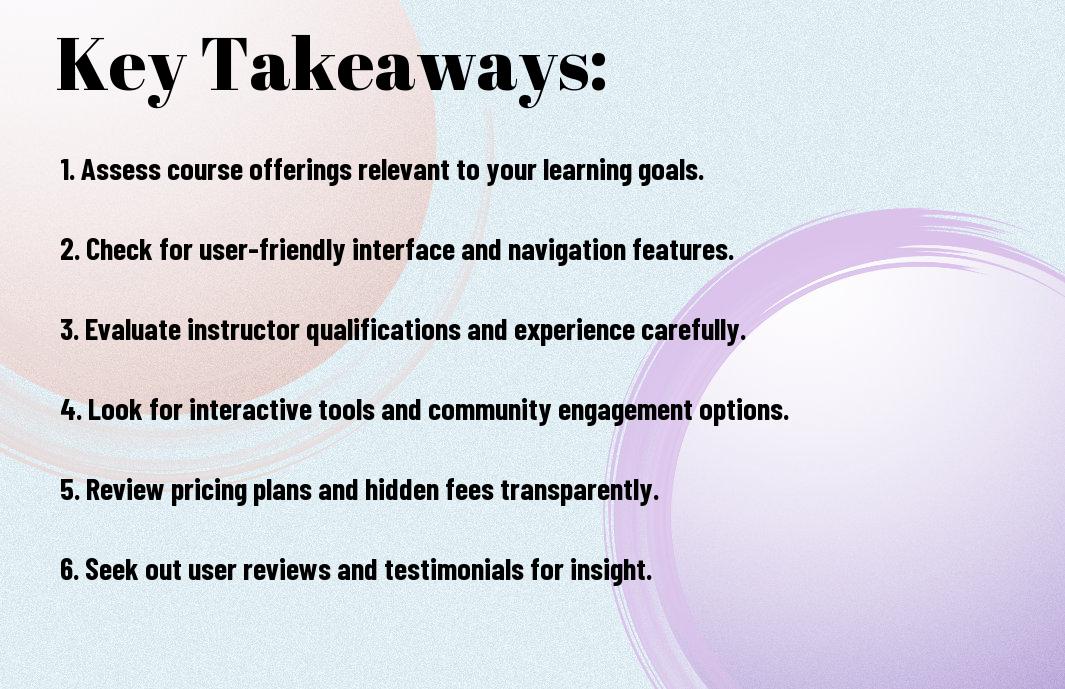You’re looking to learn something new, and the internet is your classroom. Your search for knowledge begins with finding the right online platform. You’ll need to sift through countless options, each promising to deliver the best education. Your goal is clear: find a platform that fits your needs, your schedule, and your learning style. You’re about to make a decision that will impact your learning journey, and this guide will help you make the right choice.
Key Takeaways:
To select the most suitable online learning platform, consider the following factors:
- Course Content: Ensure the platform offers a wide range of courses that align with your learning goals and interests.
- User Experience: Choose a platform with an intuitive interface and user-friendly navigation to facilitate a smooth learning experience.
- Flexibility: Opt for a platform that provides flexible scheduling and self-paced learning options to accommodate your lifestyle and learning style.
- Support: Look for a platform that offers dedicated support and resources, such as tutors, mentors, and community forums, to help you stay on track.
- Certification: Consider a platform that provides recognized certifications or credentials upon completion of courses, which can enhance your career prospects and professional development.
Defining Your Learning Needs
While navigating the vast online learning landscape, you need to define what you want to achieve. Your goals and priorities will guide your search for the perfect platform.
Identifying Your Goals
Besides knowing what subjects you want to study, you should consider what you hope to gain from online learning. Are you looking to improve your career prospects or simply expand your knowledge?
Assessing Your Priorities
Before exploring into the world of online learning, you must assess what matters most to you. Is it flexibility, cost, or the quality of instruction that drives your decision?
Your priorities will help you sift through the numerous options and find a platform that aligns with your needs. You’ll want to consider factors like scheduling, support, and resources to ensure a successful learning experience. By carefully evaluating your priorities, you’ll be able to make an informed decision and choose a platform that sets you up for success.

Evaluating Online Platforms
The process of evaluating online platforms requires careful consideration of several factors. You will need to assess your needs and goals to find the best platform for your online learning journey.
Features and Functionality
Besides the course offerings, consider the features and functionality of the platform. You should look for a user-friendly interface, interactive tools, and multimedia content to enhance your learning experience.
User Reviews and Ratings
By examining user reviews and ratings, you can gain insight into the platform’s strengths and weaknesses. You will be able to make a more informed decision about which platform to choose.
The user reviews and ratings will give you a sense of how other learners have experienced the platform. You can look for reviews that mention specific features, such as video quality or instructor support, to get a better understanding of what to expect from the platform. You should also pay attention to the overall rating and the number of reviews to get a sense of the platform’s reliability and reputation.
Considering Cost and Accessibility
Not all online learning platforms are created equal, and you’ll want to consider your budget when making a decision. You can find helpful tips on what to look for in a platform at Top 10 Things to Look For When Choosing the Perfect Online Course Platform.
Pricing Models and Packages
Alongside your research, you’ll find that pricing models vary, and you should consider what packages best fit your needs, as you evaluate the costs and benefits of each option.
Technical Requirements and Support
Cost savings can be lost if technical issues arise, and you’ll want to ensure the platform you choose has the support you need to succeed, so you can focus on your learning goals.
Further, when evaluating technical requirements and support, you’ll want to consider the level of assistance provided, such as FAQs, email support, or live chat, and whether the platform is compatible with your device and internet connection, so you can access your courses without interruption, and get the help you need when you need it, to make the most of your online learning experience.
Exploring Course Options and Quality
For your online learning journey, you need to find a platform that suits your needs. You’ll want to explore the various course options and assess their quality to ensure they meet your goals.
Curriculum and Content
By examining the curriculum, you can determine if the courses align with your interests and career aspirations. You should look for a platform that offers a well-structured and comprehensive curriculum.
Instructor Expertise and Support
Behind every great course is an experienced instructor. You should check the instructor’s credentials and teaching style to ensure they can provide the support you need to succeed.
This aspect of online learning is vital, as a skilled instructor can make a significant difference in your learning experience. You should look for instructors who are not only knowledgeable in their field but also passionate about teaching and willing to provide ongoing support. You can often find this information in instructor profiles or course reviews, giving you a better understanding of what to expect from the course.

Assessing Interaction and Community
All online learning platforms offer some form of interaction, but you need to assess what works best for your needs. You should consider how you will engage with instructors and peers, and what tools are available to facilitate discussion and collaboration.
Discussion Forums and Collaborative Tools
Technologies such as video conferencing and screen sharing enable you to interact with instructors and peers in real-time, facilitating a more immersive learning experience. You can use these tools to ask questions, share ideas, and work on group projects.
Social Learning and Networking Opportunities
Among the key benefits of online learning is the opportunity to connect with students from diverse backgrounds and industries, expanding your professional network. You can leverage these connections to learn from others, share knowledge, and gain new insights.
Understanding how social learning and networking opportunities can enhance your online learning experience is vital. You can participate in online communities related to your course, join discussion groups, and attend virtual events to expand your network and build relationships with peers and instructors, ultimately enriching your learning journey.
Ensuring Accountability and Feedback
Keep in mind that a good online learning platform should provide you with tools to track your progress and stay motivated. You need to be able to see how far you’ve come and what you still need to work on.
Tracking Progress and Performance
Between assessments and evaluations, you should be able to gauge your understanding of the material and identify areas where you need improvement. This will help you stay on track and make the most of your online learning experience.
Receiving Constructive Feedback and Support
The key to your success lies in getting timely and relevant feedback from instructors or peers. You should be able to reach out to them when you need help or clarification on a concept.
Consequently, you will be able to adjust your learning strategy and make progress towards your goals. You will feel more confident in your abilities and more motivated to continue learning, knowing that you have support when you need it. This, in turn, will help you get the most out of your online learning experience.
Final Words
On the whole, you’ve got the tools to choose the best online learning platform for your needs. You’ve weighed your options, considered your goals, and narrowed down your search. Now, it’s time to take the leap and start learning. Your path to knowledge is waiting, and with the right platform, you’ll be on your way to achieving your goals in no time. You’ll find the one that fits your style, and your learning journey will be underway.
FAQ
Q: What are the key factors to consider when selecting an online learning platform?
A: When choosing the best online learning platform, several factors should be taken into account. First, consider the variety of courses and programs offered, ensuring they align with your learning goals and interests. The platform’s user interface and navigation are also important, as an intuitive design will enhance your learning experience. Additionally, look into the qualifications and expertise of the instructors, as well as the level of support provided, such as discussion forums, live sessions, and accessible customer service. Lastly, evaluate the platform’s accessibility across different devices and its compatibility with various operating systems to ensure seamless learning on the go.
Q: How can I assess the quality and effectiveness of an online learning platform?
A: Assessing the quality and effectiveness of an online learning platform involves several steps. Start by reading reviews and testimonials from current and past learners to gain insights into their experiences. Check for any accreditations or certifications the platform has, as these can be indicators of its adherence to educational standards. It’s also beneficial to look at the platform’s engagement metrics, such as completion rates and learner satisfaction surveys, which can provide a glimpse into the platform’s ability to retain learners and meet their needs. Furthermore, many platforms offer free trials or introductory courses; utilizing these can give you a firsthand experience of the content quality and teaching methods.
Q: What role does cost play in choosing the best online learning platform, and are there any affordable options available?
A: The cost of an online learning platform is a significant factor for many learners. While some platforms can be quite expensive, especially those offering specialized or degree-level courses, there are also numerous affordable options available. Many platforms provide courses on a subscription basis, which can be more cost-effective than paying per course. Additionally, some platforms offer financial aid, scholarships, or income-based repayment plans for their programs. It’s also worth looking into platforms that offer free courses, although these might not always come with certificates upon completion. Ultimately, the best approach is to balance your budget with your learning needs, considering not just the cost but also the value the platform can offer in terms of skills acquisition and career advancement.

